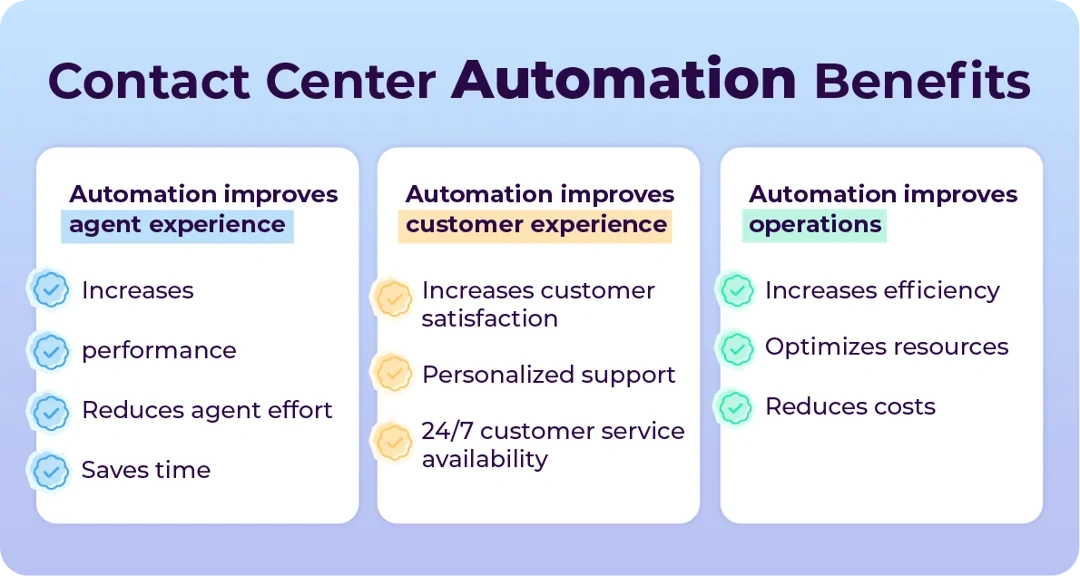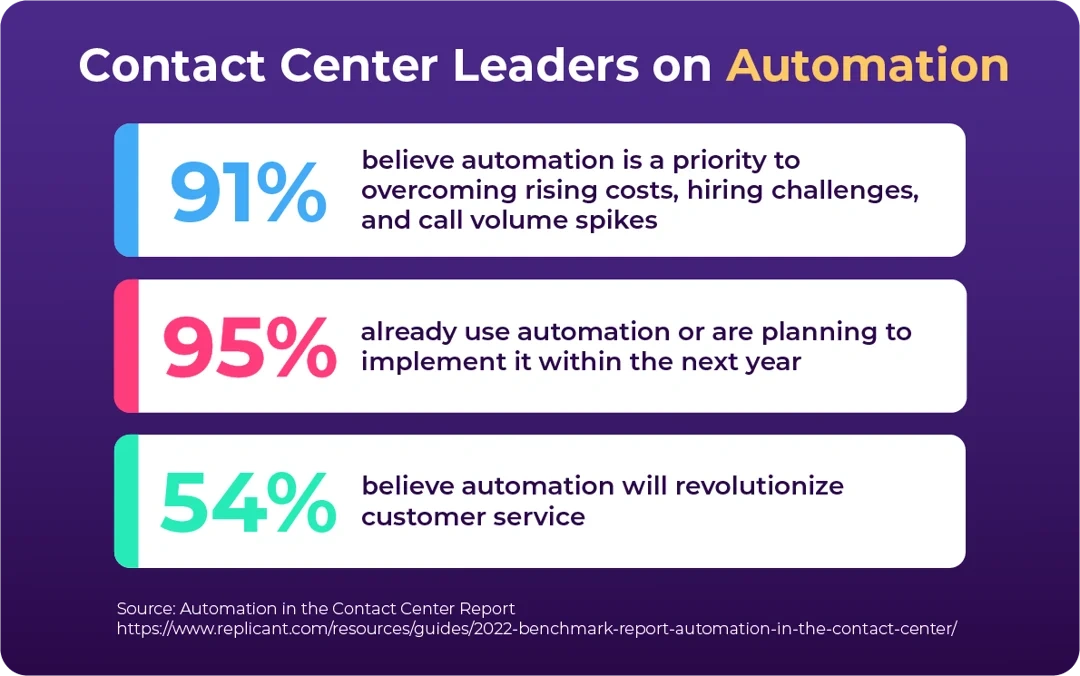Contact center automation offers significant advantages across all facets of operations.
The overwhelming majority of contact center leaders have either already implemented or are planning to implement automation within the next year. This trend underscores the urgency for leaders seeking to streamline operations, boost agent performance, and elevate customer satisfaction to prioritize investments in contact center automation as soon as possible to avoid a competitive disadvantage.
What is contact center automation?
Contact center automation uses technology such as artificial intelligence (AI) to perform manual tasks in place of humans.
It optimizes agent efficiency by handling repetitive and time-consuming tasks and processes. It also gathers customer data, leverages analytics, and offers insights into evolving customer needs to continuously improve the customer experience. Additionally, it elevates contact center key performance indicators such as first call resolution (FCR), average handle time (AHT), and customer satisfaction scores (CSAT).
Furthermore, the combination of these factors contributes to reducing contact center costs and ensuring a positive return on investment (ROI).
Why is automation important in contact centers?
Contact center automation has quickly risen to the forefront of the customer service industry, with 91% of leaders agreeing that automation is a priority to overcome rising costs, recruitment challenges, and surges in call volume. By diminishing the reliance on human intervention, contact centers are able to increase productivity and efficiency, optimize operations, and improve customer retention.
Customer satisfaction is one of the most important metrics for any business.
Automation of knowledge improves the way that agents handle customer interactions, quickly identifying their needs and offering timely and accurate solutions, thereby empowering agents to provide optimal support.
By consistently delivering exceptional customer experiences, businesses can cultivate brand loyalty and trust. This emphasizes the invaluable role of contact center automation in shaping the future of the customer service industry.
Will automation replace contact center agents?
While contact center automation undoubtedly reduces the reliance on human work, it will not replace human agents.
Despite the rise of self service options, 76% of customers contact support by phone and 86% of customers continue to favor interactions with human agents, especially when facing complex issues where human assistance remains essential.
Automation excels in alleviating agents from repetitive, low-value tasks but it lacks the depth of human interactions that most customers desire. Even with the advanced capabilities of automation technology, customers will often continue to seek support from a live agent.
While automation plays an essential role, agents remain the most invaluable asset for any contact center.
Types of contact center automation technology
Robotic Process Automation (RPA)
Robotic process automation refers to technology that is used to streamline processes through the automation of repetitive tasks within an agent's daily workflow. For example, by unifying agent systems into a single desktop, contact centers can create a cohesive workflow and reduce unnecessary friction. This eliminates the need for constant task switching, reduces errors, and enables agents to focus solely on the customer interaction.
Natural Language Processing (NLP)
Natural language processing recognizes human speech and understands customer intent by listening to specific keywords and phrases. For example, Agent Assist, an AI-powered conversation guidance software, can analyze the context of a conversation to provide agents with knowledge suggestions in real time.
Interactive Voice Response (IVR)
Interactive voice response is an automated phone system that allows customers to find solutions through a voice response system without a live agent. If it cannot find the information that the customer is looking for, it can direct them to the right department. Self-service chatbots are an example of IVR as they provide automated customer service by responding to basic customer queries, thereby reducing the repetitive tasks usually handled by agents.
Machine Learning
Machine learning is used to analyze customer interactions and gather data to identify patterns within the customer journey. It allows contact centers to gain deeper insights into customer needs, recognize performance gaps, and understand areas where improvements can be made to elevate efficiency and overall productivity.
The benefits of contact center automation
Increases performance metrics
By capturing customer data, providing insights and real-time knowledge suggestions, and handling manual post-call work, automation empowers agents to work with heightened efficiency. This increase in productivity equips agents to excel in their roles, leading to improved key performance metrics such as call handling time and first call resolution.
Reduces agent effort
Minimizing or eliminating low-value tasks with automation reduces effort and frees agents to engage in productive and complex customer interactions. By taking on more analytical work, agents become aware of their impact on the customer experience, increasing their engagement and motivation to grow in their roles.
Saves time
Automation allows agents to handle more calls per day, limit the time customers spend on hold, reduce problem resolution time, and improve response time. Additionally, it accelerates speed to proficiency by eliminating time-consuming tasks, enabling new agents to quickly grasp processes, and instilling a sense of confidence in their roles.
Boosts customer satisfaction
Automation empowers agents to increase the accuracy and consistency of their responses, resulting in quick and efficient problem resolution. Consequently, customers are spared the inconvenience of prolonged hold times or the need for escalations. As customers receive the quality of support they have come to expect, customer loyalty, trust, and retention increase.
Offers personalized support
Automation equips agents with the time and data they need to focus on establishing connections with customers. This, in turn, cultivates human-centered interactions and fosters a higher level of empathetic support, enabling customers to build meaningful relationships with the brand.
Provides 24/7 customer service availability
With automated chatbots providing the option for self service, customers can access support every day, at any time of day. This empowers customers to autonomously handle basic issues, ranging from making order changes to updating their personal information, at their own convenience.
Increases operational efficiency
79% of customers rank efficiency as a top contact center trait. Automation stands as the winning solution to increase efficiency and productivity by addressing spikes in call volumes, reducing data errors, and offering comprehensive insights and analytics. Moreover, it empowers leaders to refine operational strategies by gaining deeper insights into the customer journey, optimizing performance metrics, and identifying points of friction.
Optimizes resources
Automation helps increase call capacity and address hiring and retention challenges caused by chronic labor shortages. By allowing chatbots to handle routine customer issues, agents can dedicate their expertise to complex processes, thereby ensuring an efficient allocation of resources.
Reduces costs
62% of contact centers acknowledge that investing in automation translates to financial cost reduction. Automation achieves these savings by decreasing low-value agent workload, offering self service options, and lowering the demand for new agent hires. Beyond immediate cost savings, heightened customer retention also contributes to increased profitability.

The future of contact center automation
The customer service industry is undergoing rapid transformation with the introduction of contact center automation.
More than half of contact centers believe that automation will have a disruptive or revolutionary impact on customer service. Although automation won’t replace contact center agents, it undeniably stands as an essential investment aimed at simplifying processes, reducing workload, preventing agent burnout, and improving customer satisfaction.
For more information on automating your business processes to streamline repetitive tasks and eliminate manual interventions, explore our integrations page.




